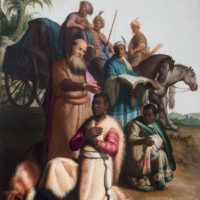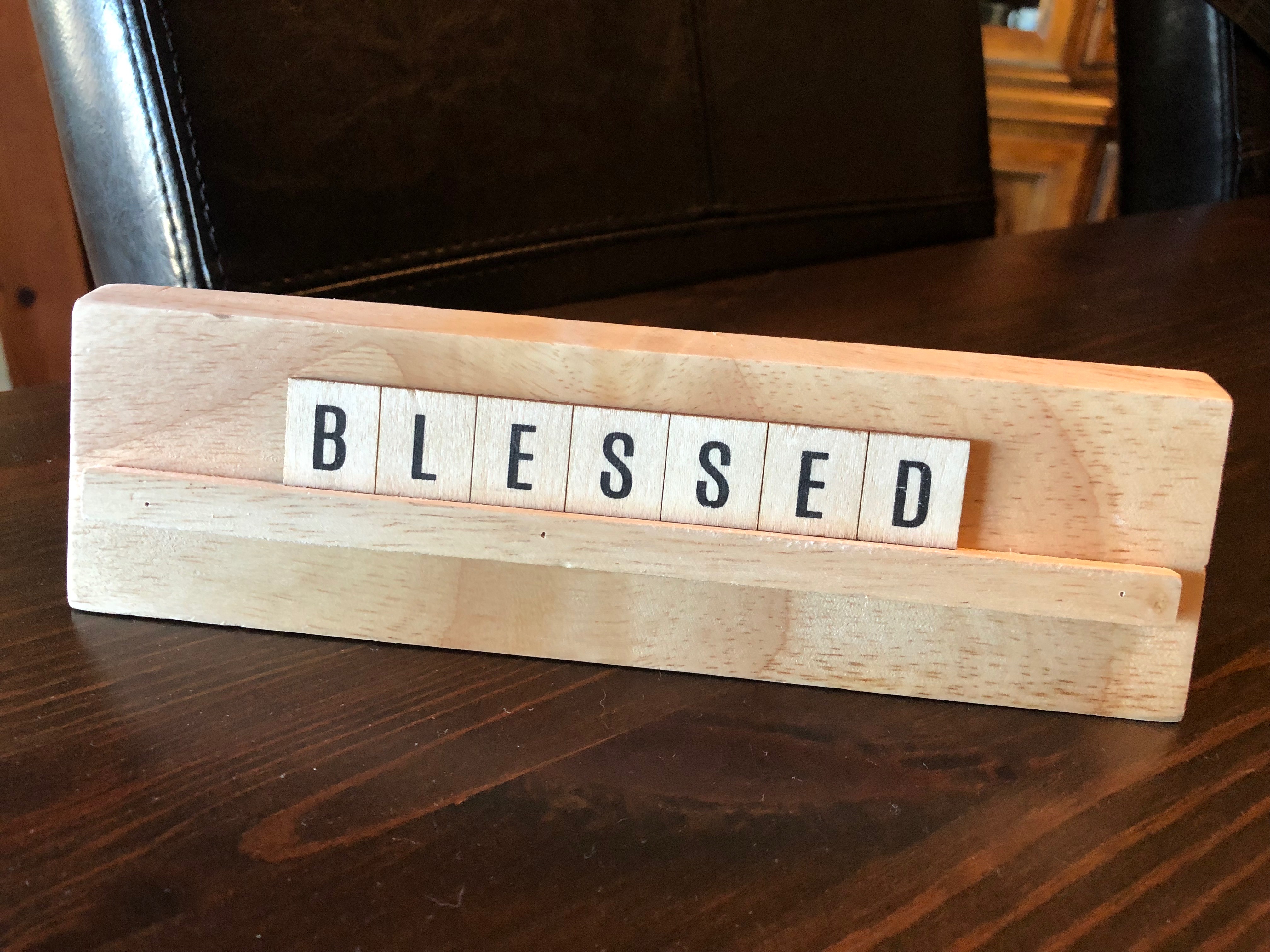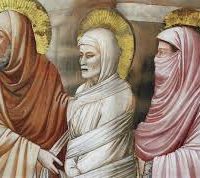And Jesus said to his disciples, ‘Let’s go across to the other side.’
But before we travel with Jesus and the disciples to that ‘other side’, let’s quickly recall what happened on ‘this side’, which is the west side of the Sea of Galilee, the territory called Galilee, which includes Jesus’ hometown, Nazareth. Some of these stories we heard over the course of the last Sundays.
On ‘this side’, Jesus calls his first disciples, heals several people, causes a scandal by calling a tax collector to be his follower, has a dispute with Pharisees about the Sabbath, and finishes selecting the 12 who will be his inner circle. Then he goes home to Nazareth, where the scribes proclaim that he must be in cahoots with Satan, people say that he must have gone mad, AND his family tries to restrain him and take him home.
Not surprisingly, Jesus gets out of Nazareth after all that. Then he teaches a large crowd at the lake shore in parables about the kingdom of God: that it is like a light that cannot be hid under a bushel basket, and a seed that grows – just this past week, we heard the parable of the pesky little mustard seed that becomes a shrub large enough to offer the birds under the sky respite and shelter.
And then Jesus says to his disciples, ‘Let’s go across to the other side.’
That may sound rather unremarkable to our ears, we may not even pay attention to this detail; but this little sentence, spoken to the disciples, heard by countless listeners ever since, probably caused a feeling of discomfort, apprehension and even fear. For ‘the other side’ is foreign territory: the east side of the Sea of Galilee, where the Gerasenes, a decidedly pagan and un-Jewish people, live. Jesus is taking his followers way out of their comfort zone, out of their familiar territory. And that’s scary.
For Jesus, who has not only experienced enthusiasm, but also outright rejection from his own people, even his very own family, this is the consequence of his teachings: to bring the message of God’s kingdom of peace and justice for all creation to those who are not part of his own tribe. And so the seed of God’s kingdom is already growing like a mustard seed, not so much upward, but outward, spreading and reaching unexpected realms and people.
‘Let’s go across to the other side.’
Most people don’t cross over into unknown territory lightly and easily – although I know that there are always those for whom the venture into new territory is an exciting adventure. But for most folks, crossing over into the unknown leads to feelings of discomfort, apprehension, and even fear. Most of us would rather stay where we are; for that, which we know, gives us comfort and a certain feeling of security – even if it may not be the best for us.
As a pastor, I’ve experienced many cases where a person who is getting older and lives on their own just can’t get themselves to think about a safer living situation. Have a stranger in the house? Move in with family? Move to a retirement home? Crossing to that other side, the unknown, is difficult for many, and they avoid it until they absolutely have to. Do you know anyone like that?
Today the Pride Parade is happening here in San Francisco and many other cities and towns all over the country. For the most part, today is a day of joyful celebration – but for the vast majority of kids who realize that they are gay, lesbian, transgender, bisexual or queer, to take make that journey over to ‘the other side’, where they feel they belong, to come out, is a very difficult and very scary journey. So far I haven’t talk a gay person say that they were happy when they figured out they were gay – on the contrary. There is still so much backlash for people of the GLTBQ community, from families, social circles and society. We tend to forget that on a day like today.
Crossing the Atlantic and starting over new in a different country with a different language may be exciting and a great opportunity for some – but I’ve also heard stories, usually of those who tagged along, like wives, that they were not so sure about leaving their life in Germany or Austria or Switzerland behind and to start over in Canada or the U.S. Is there anybody here who was somewhat scared about emigrating from the Old World? I was. I didn’t want to leave Germany and family and friends behind.
Right now, there is a lot of discussion about the zero tolerance policy of the current administration regarding the entry of migrants and asylum seekers into this country – and especially about the separation of children, even infants, from their parents. There was an outcry from religious leaders and organizations of many different denominations and people across party lines about this inhumane practice – and, thanks be to God, the administration undertook steps to end its own policy. However, much work needs to be done: there are still about 2,000 children who haven’t been reunited with a parent yet, and what will happen to families as they await a hearing? Right now, the Flores Act prohibits children from being kept in a jail or prison for more than 20 days. This issue is far from being resolved,
Legality and illegality aside for a moment – do you think that those seeking shelter in the U.S. make this decision lightly? That they put themselves through hardships and danger for no reason?
Many try to escape violence in their respective home countries. For them, crossing over to the other side is an act of desperation. I agree that not everyone should just cross borders without a legal procedure – I am way too German for that – and that this country needs immigration reform badly. But let’s not forget that, when we talk about migrants, we talk about human beings with their stories. The least we should advocate for is that they are treated humanely and with the dignity they deserve as those created in the image of God.
But back to the disciples in the boat now. It has been pointed out by scholars that the raging storms the disciples encounter as they are crossing the Sea of Galilee is a reflection, a natural manifestation of what they experience inside – and what most of us experience as we cross to some other unknown side: turmoil, insecurity, confusion, apprehension and anxiety. They don’t know what’s going to happen once they reach that other side. There is no safety net of the familiar. And I, for one, can emphasize with the disciples. I’ve had anxiety attacks at certain points in my life, this massive turmoil inside, and at times it feels life threatening.
And in the midst of the turmoil that the disciples experience internally and all around them, they cry out to Jesus, who, amazingly, is sleeping through it all: Teacher, do you not care that we are perishing?
And Jesus commands the sea and the wind to be still. And then he turns to the disciples and says, ‘Why are you afraid? Have you still no faith?’ And note the order of the two things: Jesus doesn’t scold the disciples and then stills the storm, but takes care of the source of their fears and panic first. As calm is restored, he challenges them.
Yes, crossing over to some other side is often not easy and makes us nervous – or worse. And often, crossing over to the other side doesn’t work out – or doesn’t work out the way we want it to. But just think about all those times in your life you have crossed over – you, who are immigrants from one country to another, all of you who have crossed from one life situation to another: somehow, you made it. Maybe you realized things weren’t as bad or scary as you thought they would be. And you probably had some things that helped you with the transition.
Maybe it was sheer luck. Maybe it was your faith. Maybe it was your trust in God’s presence. Maybe it was the prayers of people who knew what you were going through. Maybe it was people walking alongside you – people who seemed like angels. Maybe it was all of the above.
What today’s gospel lesson teaches us is that it is only natural for us as human beings to be afraid of the unknown, and to feel overwhelmed and powerless at times. And that it is okay to call on God in such moments and to ask for help. God’s first and foremost concern is our soul and our salvation. God’s not out there to ‘get us’. God is present, even though our faith may be small.
God may be present through other people, his messengers, his angels. On the flipside, God may be present for others through us – our words, our prayers, our actions, our advocacy.
Things may not work out on some other sides we get to in life. Or they may. But whatever happens, no matter, where we are or where we are going, God is already there to be with us – in times of joy, and in times of struggle.
And: God’s kingdom is already there – even in the quite unexpected, unknown and maybe scary places and circumstances, offering us shelter and, eventually, an eternal home.
Picture by Tim Marshall on unsplash.com







